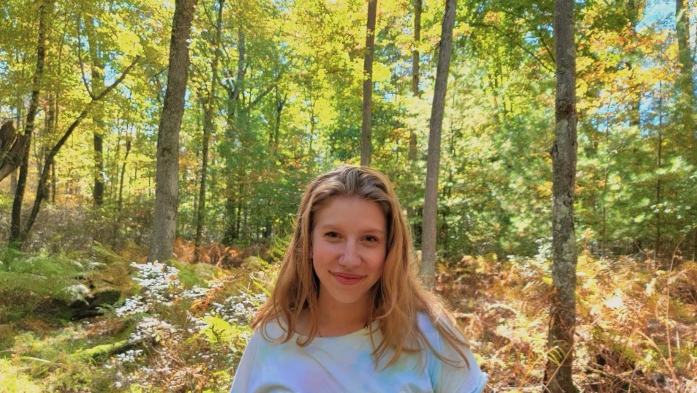Just over a year ago, I stepped through the doorway of Ferguson 101 (where I may or may not have been late for class), not knowing it would be an instrumental step for my career. In fall of 2024, I was a second-year master’s student with a thesis in environmental justice. Given the content of my research, community engagement was an essential skill to add to my practice. Late at night, browsing on LionPath for keywords, a course titled “Community Organization and Action” seemed like the perfect fit. Standing in the Ferguson doorway, looking at a class that had an equal ratio of instructors to students, I was informed that this was actually a three semester–long scholars program. With an opportunity reaching its inviting arms towards me, I quickly gained my academic adviser’s blessing and signed onto the commitment.
After spending a semester learning the theory and application of community engagement (which were completely novel concepts to me), I partnered with the Justice and Safety Institute (JASI) and their novel police de-escalation training. Originally piloted to a group of law enforcement, Keystone Community Partnerships (KCP) partnered with the Justice and Safety Institute to re-pilot the program, with a focus on community engagement. I quickly learned that this de-escalation training stood apart from the rest. Created by former police officers, trained psychologists, and an assistant district attorney, their programming never escalates to use of force; rather, it focuses on officer health and wellness, stress management techniques, and the use of body worn cameras in police testimony.

Through leveraging pre-existing connections in North Philadelphia, two influential organizations helped shape the pilot. One Day At A Time (ODAAT) is an organization serving unhoused populations in Philadelphia. ODAAT provides services for addiction recovery counseling, linkage to health and social services, transitional housing, youth programming, and community outreach. KCP partnered with ODAAT to facilitate connections with Philadelphia community members and politicians, as well as provide meeting spaces. Hope for Kids, a youth empowerment organization, connected JASI/KCP with young people located in the Northern Philadelphia region who were interested in collaboration. I relished working with stakeholders in the Philadelphia area, where I have spent many of my school breaks visiting my dearest friends.
To fund the second pilot program, JASI, KCP, and grant writer Janice Tannehill pursued a $5,000 Engaged Scholarship Consortium award. Given that grant writing seems as ubiquitous on job applications as a college degree, I enthusiastically asked to shadow Janice during the grant writing process and assisted in writing the application. The Engaged Scholarship grant was later awarded, inspiring me to learn the art of writing a fantastic grant application.
The program was re-piloted at the Beckett Life Center in North Philadelphia, with a combination of law enforcement officers and community members in high-stress careers in the audience. Over the course of the two-day training, there were periods of vulnerable sharing between officers and community members, who bonded over the high-risk, physical nature of their chosen careers. I spread my research wings by taking qualitative research notes, collecting data, and listening to lived experiences a world away from Biorenewable Systems.

Experienced-Based Learning
Just over a year ago, I began my journey as a Keystone Community Scholar. In the fall of 2025, with a master’s degree and a year of community-engaged scholarship under my belt, I entered my sixth year as a student in higher education to earn my third degree—this time, a Ph.D.
My experience as a Keystone Community Scholar inspired me to continue with KCP as a doctoral student in education, development, and community engagement, working with Penn State Outreach as a graduate assistant under Jamison Malcolm, as well as interning as a grant writer under Janice Tannehill. Outreach funding is also not restricted when it comes to research, giving me the freedom to choose my dissertation topic. After taking that first step through Ferguson, I am becoming the social scientist I am meant to be.
About the Author
 Emma Steely is a first year Ph.D. student in education, development, and community engagement with an assistantship through Keystone Community Partnerships. Steely’s past research has focused on environmental justice in engineering education, with a secondary focus on universal design for learning. Steely is passionate about environmental equity, anti-racist pedagogy, and climate resiliency. Around campus, Steely is a Keystone Community Scholar, an AgAccess Graduate Fellow, and a semi-dedicated lap swimmer at the White Building pool. In her free time, Emma has devoured 55 books this year, with the hope of winning her family’s annual book reading competition.
Emma Steely is a first year Ph.D. student in education, development, and community engagement with an assistantship through Keystone Community Partnerships. Steely’s past research has focused on environmental justice in engineering education, with a secondary focus on universal design for learning. Steely is passionate about environmental equity, anti-racist pedagogy, and climate resiliency. Around campus, Steely is a Keystone Community Scholar, an AgAccess Graduate Fellow, and a semi-dedicated lap swimmer at the White Building pool. In her free time, Emma has devoured 55 books this year, with the hope of winning her family’s annual book reading competition.

